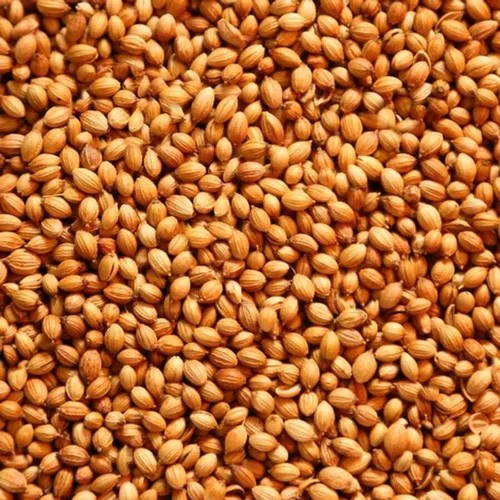
Coriander Seeds
Description of Coriander Seeds (Dhania) of Rajasthan
Coriander seeds, known locally as "Dhania," are an essential spice in Indian cuisine and have a prominent place in Rajasthan's agricultural landscape. Rajasthan, with its unique climatic conditions and traditional farming practices, produces some of the finest quality coriander seeds in India. These seeds are celebrated for their distinctive flavor, aroma, and versatile applications in culinary and medicinal contexts.
Geographical and Climatic Conditions
- Region: Rajasthan, the largest state in India, is known for its arid and semi-arid climate, which is ideal for the cultivation of spices, including coriander. Key coriander-growing regions in Rajasthan include Kota, Baran, Bundi, and Jhalawar.
- Climate: The region experiences hot summers and cool winters, with a relatively low annual rainfall. These climatic conditions are conducive to growing coriander, which requires dry weather for optimal seed development.
- Soil: The sandy loam and alluvial soils of Rajasthan, which are well-drained and moderately fertile, provide a suitable environment for coriander cultivation.
Botanical Characteristics
- Scientific Name: Coriandrumsativum
- Family: Apiaceae (Umbelliferae)
- Plant Description: Coriander is an annual herb that grows to a height of 50–80 cm. It has slender, hollow stems and finely divided, lacy leaves. The plant produces small, white or pale pink flowers arranged in umbels.
- Seed Description: The seeds are small, round, and ribbed, with a diameter of about 3-5 mm. They are usually light brown to yellowish-brown in color and have a characteristic citrusy aroma and flavor.
Cultivation Practices
- Sowing Season: Coriander is typically sown in the Rabi season (winter crop), from October to November, taking advantage of the post-monsoon soil moisture.
- Seed Rate: Approximately 10-12 kg of seeds are used per hectare. Seeds are sown in rows spaced about 30 cm apart, ensuring proper growth and ease of cultivation.
- Irrigation: Coriander requires minimal irrigation, with 2-3 waterings during the growing period being sufficient. Excess water can lead to fungal diseases and affect seed quality.
- Pest and Disease Management: Common pests include aphids and caterpillars, while diseases like powdery mildew and wilt can impact the crop. Integrated pest management and timely fungicide applications help maintain crop health.
- Harvesting: The crop is ready for harvest in about 90-110 days, typically between February and March. The plants are cut when the seeds turn light brown and are still firm. After cutting, they are dried, threshed, and winnowed to separate the seeds.
Physical and Chemical Properties
- Appearance: Coriander seeds from Rajasthan are known for their uniform size, shape, and color. They are usually plump, round, and have a distinct ridged texture.
- Aroma and Flavor: These seeds are highly aromatic, with a warm, spicy, and citrusy flavor profile. The unique terroir of Rajasthan contributes to the robust and complex flavor of the coriander seeds.
- Essential Oil Content: The seeds have a high essential oil content, predominantly composed of linalool and pinene, which are responsible for their characteristic fragrance and flavor. The essential oil content typically ranges from 0.2% to 1.0%.
- Nutritional Value: Coriander seeds are rich in dietary fiber, essential oils, vitamins (such as vitamin C and vitamin K), and minerals (including calcium, magnesium, and iron). They also contain antioxidants and have various health benefits.
Applications and Uses
- Culinary Uses: Coriander seeds are a key ingredient in Indian cuisine, used whole or ground in a variety of dishes such as curries, pickles, chutneys, and spice blends like garam masala. They are also used in baking and flavoring beverages.
- Medicinal Uses: Coriander seeds have been used traditionally for their medicinal properties, including digestive aid, anti-inflammatory effects, and benefits for managing diabetes and cholesterol. They are also used in Ayurvedic medicine for treating various ailments.
- Industrial Uses: The essential oil extracted from coriander seeds is used in the flavoring and fragrance industries. It is a common ingredient in soaps, perfumes, and cosmetics due to its pleasant aroma and therapeutic properties.
- Cultural Significance: Coriander has a long-standing presence in Indian culture and cuisine. It is often used in traditional rituals and ceremonies and holds symbolic significance in various regional practices.
Economic Importance
- Local Economy: Coriander cultivation is a significant source of income for farmers in Rajasthan. The crop is relatively low-maintenance and provides good yields, making it an economically viable option.
- Market Demand: The high quality and distinct flavor of coriander seeds from Rajasthan have led to strong demand in both domestic and international markets. Major export destinations include the Middle East, Europe, and North America.
- Value Addition: Processing activities such as cleaning, grading, and packaging enhance the market value of coriander seeds. This not only provides better returns for farmers but also supports local industries involved in the processing and export of spices.
Challenges and Opportunities
- Challenges: Coriander cultivation in Rajasthan faces challenges such as variable weather conditions, pest infestations, and diseases. Additionally, fluctuations in market prices can impact profitability.
- Opportunities: There are opportunities for improving yield and quality through the adoption of advanced farming techniques, such as precision farming, and the use of high-quality, disease-resistant seed varieties. Expanding export markets and promoting organic and value-added products can also enhance economic benefits.
Conclusion
Coriander seeds from Rajasthan are highly valued for their unique flavor, aroma, and quality. The region's favorable climate and traditional cultivation practices contribute to the superior characteristics of these seeds. With strong demand and significant economic importance, coriander cultivation plays a vital role in the agricultural landscape of Rajasthan. Continued focus on sustainable farming practices and market expansion will ensure the ongoing success and popularity of Rajasthan's coriander seeds in the global spice market.
